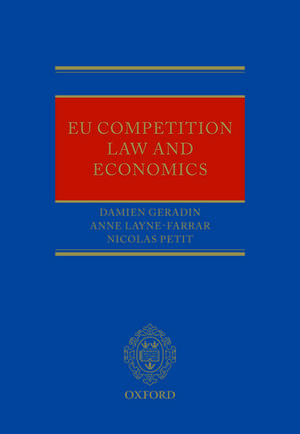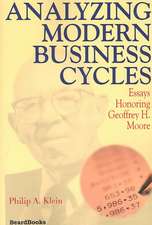EU Competition Law and Economics
Autor Damien Geradin, Anne Layne-Farrar, Nicolas Petiten Limba Engleză Hardback – 21 mar 2012
Preț: 1559.79 lei
Preț vechi: 1813.71 lei
-14% Nou
298.51€ • 310.49$ • 246.43£
Carte în stoc
Livrare din stoc 05 martie
Specificații
ISBN-10: 0199566569
Pagini: 600
Dimensiuni: 178 x 246 x 38 mm
Greutate: 1.16 kg
Ediția:New.
Editura: OUP OXFORD
Colecția OUP Oxford
Locul publicării:Oxford, United Kingdom
Descriere
This is the first EU competition law treatise that fully integrates economic reasoning in its treatment of the decisional practice of the European Commission and the case-law of the European Court of Justice. Since the European Commission's move to a "more economic approach" to competition law reasoning and decisional practice, the use of economic argument in competition law cases has become a stricter requirement. Many national competition authorities are also increasingly moving away from a legalistic analysis of a firm's conduct to an effect-based analysis of such conduct, indeed most competition cases today involve teams composed of lawyers and industrial organisation economists.
Competition law books tend to have either only cursory coverage of economics, have separate sections on economics, or indeed are far too technical in the level of economic understanding they assume. Ensuring a genuinely integrated approach to legal and economic analysis, this major new work is written by a team combining the widely recognised expertise of two competition law practitioners and a prominent economic consultant. The book contains economic reasoning throughout in accessible form, and, more pertinently for practitioners, examines economics in the light of how it is used and put to effect in the courts and decision-making institutions of the EU. A general introductory section sets EU competition law in its historical context. The second chapter goes on to explore the economics foundations of EU Competition law. What follows then is an integrated treatment of each of the core substantive areas of EU competition law, including Article 101 TFEU, Article 102 TFEU, mergers, cartels and other horizontal agreements, vertical restraints and technology transfer agreements.
Recenzii
In short, this publication gives a very logical approach to, and critical account of, the various legal and economic factors which influence and shape current EU competition law practice as well as EU competition policy formation. In the mind of this reviewer, there is no doubt that this book will establish itself as one of the standard works in the area of EU competition law as, given its thoroughness and clarity, it represents an invaluable tool for academics and practitioners alike.
This book, dedicated to the study of competition law in the European Union, stands out through its particularly strong multidisciplinary approach.
Its analytical and explorative dimensions make this work a useful tool of the trade, as much for researchers and students in search of theoretical reflection, as for practitioners.
Notă biografică
Damien Geradin is a Partner at Howrey LLP in Brussels and Professor of Competition Law and Economics at Tilburg University (The Netherlands). His areas of research include competition law, network industries (telecommunications, postal services, energy and transport), and the interface between IP and competition law.Anne Layne-Farrar is a director at economic consultants, LECG. Dr Layne-Farrar specializes in antitrust matters where the core issues are at the intersection of intellectual property economics and competition policy. She advises clients on competition, regulation, policy, and intellectual property issues across a range of industries with a focus on high-tech.Nicolas Petit is Professor of Competition Law at the University of Liège. In May 2007, he completed a PhD on oligopolies and tacit collusion under EC competition law. In addition to this, he has written a number of articles on Article 82 EC, the introduction of competition rules within international agreements as well as on the relationships between competition rules and sector specific regulation.














